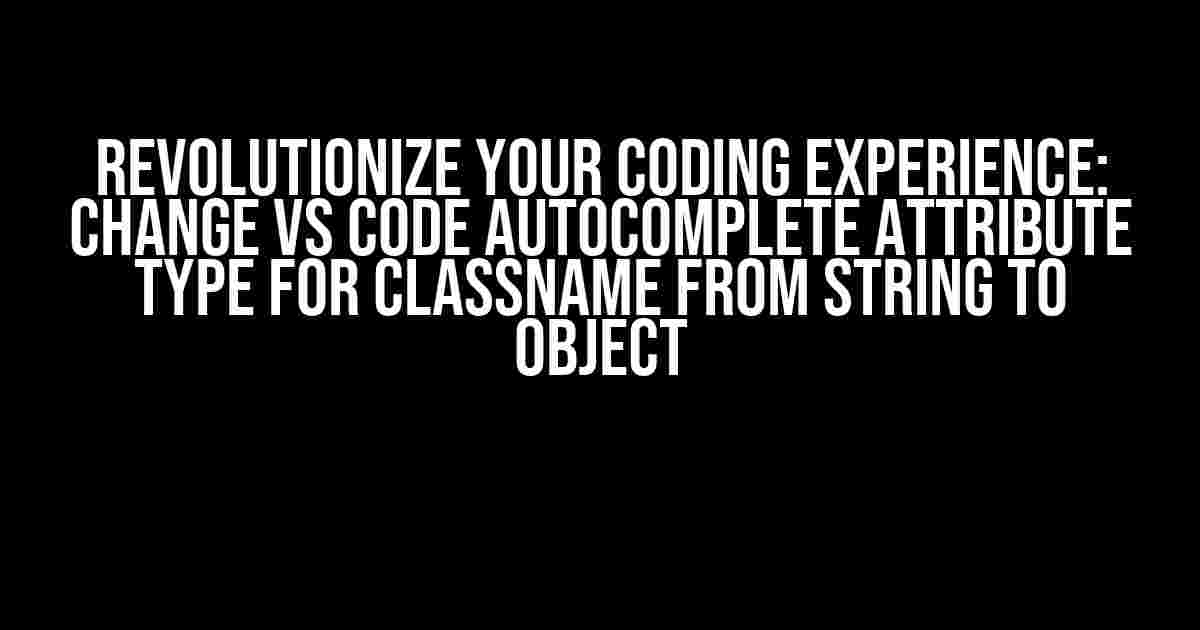Are you tired of dealing with tedious and time-consuming coding issues in VS Code? Do you struggle with the автocompletion feature for the `className` attribute, which insists on suggesting strings instead of objects? Well, worry no more! In this comprehensive guide, we’ll take you by the hand and walk you through the process of changing the autocomplete attribute type for `className` from string to object in VS Code.
Why Do We Need to Make This Change?
By default, VS Code’s autocomplete feature for the `className` attribute suggests strings, which can be limiting and frustrating. When you’re working with a complex CSS-in-JS solution or a styled component, you need more flexibility and control over your code. By changing the autocomplete attribute type to object, you can unlock a world of possibilities and take your coding experience to the next level.
Here are just a few benefits of making this change:
- Improved code readability and maintainability
- Faster development and reduced errors
- Enhanced flexibility and control over your code
- Better support for complex CSS-in-JS solutions and styled components
Step 1: Check Your VS Code Version
Before we dive into the process, make sure you’re running a compatible version of VS Code. You’ll need VS Code 1.44 or later to take advantage of this feature. If you’re running an earlier version, update to the latest version to ensure compatibility.
code --version
Open your terminal or command prompt, type the command above, and press Enter. This will display your current VS Code version. If you need to update, follow the prompts to download and install the latest version.
Step 2: Create a `jsconfig.json` File
In VS Code, create a new file called `jsconfig.json` in the root directory of your project. This file will hold the configuration settings for your JavaScript project.
{
"compilerOptions": {
"module": "commonjs",
"target": "es6",
"outDir": "build"
}
}
Create a basic configuration with the above code. You can customize these settings as needed for your project, but for now, we’ll focus on the bare minimum required for this tutorial.
Step 3: Update `jsconfig.json` with `jsxAttributeCompletion`
Now, let’s update our `jsconfig.json` file to include the `jsxAttributeCompletion` property. This will enable us to customize the autocomplete behavior for JSX attributes, including the `className` attribute.
{
"compilerOptions": {
"module": "commonjs",
"target": "es6",
"outDir": "build",
"jsxAttributeCompletion": {
"className": "object"
}
}
}
We’ve added a new property called `jsxAttributeCompletion` and nested the `className` property within it. By setting `className` to `”object”`, we’re telling VS Code to suggest objects instead of strings for the `className` attribute.
Step 4: Save and Reload VS Code
Save your `jsconfig.json` file and reload VS Code by running the following command:
code --reload
This will restart VS Code and apply the new configuration settings.
Step 5: Verify the Change
Open a new file or an existing file in your project and start typing the following code:
<div className={ }
As you type the opening brace `({`, you should see the autocomplete suggestions change to reflect the new object type.
| Before | After |
|---|---|
|
|
Congratulations! You’ve successfully changed the autocomplete attribute type for `className` from string to object in VS Code.
Troubleshooting and FAQs
If you’re experiencing issues or have questions, check out our troubleshooting section below:
Q: I’m still seeing string suggestions for `className`. What’s wrong?
A: Make sure you’ve saved and reloaded VS Code after updating your `jsconfig.json` file. Also, ensure that you’ve correctly spelled and formatted the `jsxAttributeCompletion` property.
Q: Can I change the autocomplete behavior for other JSX attributes?
A: Yes! You can customize the autocomplete behavior for other JSX attributes by adding them to the `jsxAttributeCompletion` property. For example, you can add a property for the `style` attribute:
{
"compilerOptions": {
"module": "commonjs",
"target": "es6",
"outDir": "build",
"jsxAttributeCompletion": {
"className": "object",
"style": "object"
}
}
}
This will enable object suggestions for the `style` attribute as well.
Conclusion
By following these simple steps, you’ve successfully changed the autocomplete attribute type for `className` from string to object in VS Code. This powerful feature will revolutionize your coding experience, allowing you to work more efficiently and effectively with complex CSS-in-JS solutions and styled components.
Remember to experiment with customizing the autocomplete behavior for other JSX attributes and explore the vast possibilities that this feature has to offer.
Happy coding!
Here are 5 Questions and Answers about “Change VS Code autocomplete attribute type for className from string to object” :
Frequently Asked Question
Get ready to boost your coding skills with these frequently asked questions about changing VS Code autocomplete attribute type for className from string to object!
Why do I need to change the autocomplete attribute type for className from string to object in VS Code?
By default, VS Code assumes that the className attribute is a string. However, when using a CSS-in-JS solution like styled components or emotion, the className attribute is actually an object. Changing the autocomplete attribute type to object helps VS Code provide more accurate and relevant suggestions, making your coding experience more efficient.
How do I change the autocomplete attribute type for className from string to object in VS Code?
You can change the autocomplete attribute type by creating a custom settings file in VS Code. Add the following line to your settings.json file: “[html]”: {“auto-close-tags”: {“attributes”: {“className”: {“type”: “object”}}}}. This will tell VS Code to treat the className attribute as an object.
Will changing the autocomplete attribute type affect my existing code?
No, changing the autocomplete attribute type will not affect your existing code. This setting only affects the autocomplete suggestions provided by VS Code, not the actual code itself. Your existing code will continue to work as before, and you can still use the className attribute as a string if needed.
Can I change the autocomplete attribute type for other attributes besides className?
Yes, you can change the autocomplete attribute type for other attributes besides className. For example, you can change the type for the style attribute or any other attribute that requires a specific type. Simply add the attribute name and type to the settings.json file, and VS Code will update the autocomplete suggestions accordingly.
Where can I learn more about customization options in VS Code?
You can learn more about customization options in VS Code by checking out the official VS Code documentation, which provides detailed information on various settings and configuration options. You can also explore online tutorials, blogs, and forums dedicated to VS Code customization and optimization.
I hope you enjoyed these Q&A’s!



